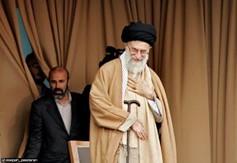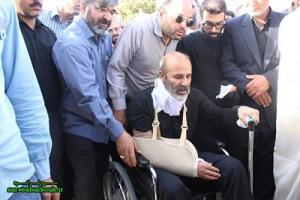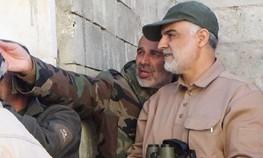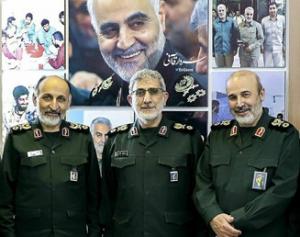Mohammad Reza Fallahzadeh: Deputy Commander of the IRGC’s Quds Force
Download PDFPage Navigation
Mohammad Reza Fallahzadeh’s career has straddled both the Islamic Revolutionary Guard Corps (IRGC) and the Islamic Republic’s domestic politics as a provincial governor. His service in the Quds Force has included battlefield experience in Syria, and which enabled him to eventually ascend to the level of deputy commander. Fallahzadeh has found himself replacing senior IRGC commanders, who outrank him in their breadth and depth of experience – a testament to the continued vacuum in Quds Force leadership resulting from the death of its former Commander Major General Qassem Soleimani in 2020.
Mohammad Reza Fallahzadeh’s Career
 Mohammad Reza Fallahzadeh behind Ayatollah Ali Khamenei in Yazd Province during his governorship.
Mohammad Reza Fallahzadeh behind Ayatollah Ali Khamenei in Yazd Province during his governorship.
Mohammad Reza Fallahzadeh was born in Yazd in 1962 or 1963. His brother was reportedly killed in combat during the Iran-Iraq War in 1987. Unlike many commanders within the IRGC today, Fallahzadeh lacks high-profile battlefield experience during the Iran-Iraq War.
Fallahzadeh’s official biography notes his years of service as commander of the 19th Fajr Fars and 33rd Al-Mahdi Divisions, as well as commander of the IRGC in Yazd, Esfahan, and Fars provinces. Additionally, he served as commander of the Karbala construction camp, an IRGC-operated economic entity active in mining, railway construction, road construction, and oil pipeline construction industries. He later transitioned from the IRGC into the regime’s domestic politics, serving as a governor of Yazd Province during the presidential administration of Mahmoud Ahmadinejad from 2007-2013. During Ahmadinejad’s presidency, many IRGC officers served in governorships and ministerial roles. When he was governor, Fallahzadeh was pictured near Iran’s supreme leader Ayatollah Ali Khamenei during one of his provincial visits. There is little public record of Fallahzadeh having an especially deep personal relationship with Khamenei, though the supreme leader once stated that he includes him in his personal prayers. That said, the fact that he was appointed deputy Quds Force commander indicates his close ties to Khamenei’s office, given that the Quds Force is directly connected to the Office of Supreme Leader unlike other IRGC branches.
Early Career
 Photo of Mohammad Reza Fallahzadeh after he was injured in Syria
Photo of Mohammad Reza Fallahzadeh after he was injured in Syria
While governor, Fallahzadeh was quoted in media reports suggesting that the failure of 1980 Operation Eagle Claw, which was ordered by then-President Jimmy Carter to rescue the U.S. hostages, was a “divine miracle” to protect the Islamic Republic against the U.S., which he dubbed “the symbol of evil.”
After his governorship ended as Hassan Rouhani assumed the presidency, Fallahzadeh became the chief of Karbala Roads and Urban Development, a subsidiary of the IRGC’s Khatam al-Anbia Construction Headquarters. But following a tenure of only a few months, Fallahzadeh was deployed by the IRGC to Syria. In 2016, Iranian media reports suggested he was injured during his deployment there.
Accounts of Fallahzadeh’s role in Syria indicate that he held a senior-level battlefield command in the area near Aleppo. Other sources suggest he was deployed at the eastern fronts, including Deir Ezzor, al-Raqa, al-Hasekeh, and the Badiya region. Some reports place him as the IRGC’s second-in-command in the country under Soleimani with control over 18,000 non-Iranian militants, most specifically the Afghan Fatemiyoun and Pakistani Zainabiyoun Brigades. However, as some observers have noted, before his transfer to Syria Fallahzadeh admitted that he had no previous relationship with Soleimani, only meeting him briefly in 1984. Thus, Fallahzadeh’s parachuting into a leading role in the Syria conflict was a significant change, after holding a governorship in Yazd and spending a stint in the IRGC’s provincial commands and construction conglomerate.
Fallahzadeh participated in the 2017 International Meeting on Syrian Settlement held in Astana – a high-profile diplomatic conference. He joined then Iranian Deputy Foreign Minister for Arab Affairs Hossein Ansari as a member of the Iranian delegation. Given the leading role played by the Quds Force in determining Iran’s regional policy compared with Iran’s Foreign Ministry, Fallahzadeh’s presence was significant and increased his visibility after operating in the shadows.
 Photo of Mohammad Reza Fallahzadeh and the late Qassem Soleimani in Syria
Photo of Mohammad Reza Fallahzadeh and the late Qassem Soleimani in Syria
In 2018, after holding the rank of second brigadier general, Fallahzadeh was promoted to brigadier general. This coincided with his elevation as deputy coordinator of the Quds Force, which is the third highest ranking position within the unit. In this role, he had a close working relationship with Esmail Qaani, who was the deputy commander of the Quds Force at the time.
Deputy Quds Force Commander
 Photo of Quds Force’s top brass in early 2021. L to R: Mohammad Hejazi; Esmail Ghaani; and Mohammad Reza Fallahzadeh
Photo of Quds Force’s top brass in early 2021. L to R: Mohammad Hejazi; Esmail Ghaani; and Mohammad Reza Fallahzadeh
After the death of Soleimani in 2020, the Quds Force’s top brass underwent a reshuffling. Qaani was elevated as commander, Mohammad Hejazi became his deputy commander, while Fallahzadeh remained in his post as deputy coordinator. An April 2021 assessment from the U.S. Defense Intelligence Agency noted that Qaani “is more likely than Soleimani to delegate responsibilities, including to his deputy Mohammad Hejazi.” This is due to the loss of Soleimani, who had a unique ability to manage, meddle, and manipulate Iran’s sprawling network of proxies and partners—including significant operational experience in the Levant. Qaani lacked that skillset—and fluency in Arabic—as he previously focused on Iran’s eastern theater, particularly Afghanistan. Hejazi more than made up for this weakness, serving as the commander of the Basij, deputy commander-in-chief of the IRGC in its entirety, and in Lebanon prior to his position as deputy commander of the Quds Force. This likely figured into the U.S. assessment that Qaani would delegate to Hejazi, who had more senior level experience in the IRGC.
After Hejazi died under mysterious circumstances, Fallahzadeh assumed the role of deputy commander. Fallahzadeh differs from Hejazi in that he is a more junior officer, having only held battlefield command and provincial positions, coupled with a brief stint as the Quds Force deputy coordinator. Unlike Hejazi, he never commanded a branch of the IRGC and lacks the deep personal relationships with the regime’s political establishment that came with those positions. This therefore has raised questions as to which duties Qaani has delegated to Fallahzadeh given this gap in experience.
Early in Fallahzadeh’s tenure, he gave remarks warning “the usurping Zionist regime should know that resistance forces are located in different parts of the world next to your headquarters, and they are ready to bring about your downfall at any moment.” He hailed his predecessor, Hejazi, for being in “Syria and Lebanon for five years in complete anonymity…to wage war against God’s enemies. Without commanders…like Soleimani…and Hejazi…the world-eating America and usurping Zionist regime wouldn’t have given a chance to Islamic nations.” Fallahzadeh added “the enemies of the Islamic Revolution must know that we are inheritors of the Prophet and oppressed Imams…if they cut us to pieces and revive us several times, we will not abandon the path of Islam, and will continue our fight until the moment of Islam’s victory.” After Hamas’s attack against Israel on October 7, 2023, Fallahzadeh has made similar comments, calling for opposition to “the Zionist regime’s hegemony,” and lauding Iran’s regional proxies.
Throughout his tenure as Quds Force deputy commander, Fallahzadeh has held a relatively low profile. Apart from appearances at conferences, ceremonies, and related events, he has not been pictured on visits to Iran’s regional battlegrounds—particularly Lebanon, Iraq, and Syria. That has fallen to Qaani, who has gradually raised his profile, with more photos emerging of his travels throughout the Middle East as he has grown more comfortable in his role. In 2021, Fallahzadeh was shortlisted by the Tehran City Council to be the next mayor of Tehran. However, he remained in his post as deputy commander. In 2023, he made more foreign visits – appearing multiple times on Houthi-controlled television, briefly attending a conference in Moscow, and making a visit to pilgrimage sites in Iraq.
Despite his low profile, Fallahzadeh has a key role in coordinating terrorist operations facilitated by IRGC-Quds Force. This includes providing crucial support to Hamas prior to and following its October 7, 2023 attack on Israel, supporting maritime terrorism in the Red Sea perpetrated by the Houthis, and aiding Hezbollah. Under Fallahzadeh’s leadership, the IRGC-Quds Force has also directed its proxies in Iraq in operations against U.S. personnel. This has resulted in deadly attacks like the assault on Tower 22, which resulted in the death of 3 U.S. soldiers. These activities led the U.S. to sanction Fallahzadeh in early 2024. Based on his actions and rhetoric, these IRGC-Quds Force activities will likely escalate as Fallahzadeh moves into a more assertive leadership position.
Future Prospects
Mohammad Reza Fallahzadeh’s elevation as deputy commander automatically puts him into contention as a successor to Esmail Qaani as commander of the Quds Force. His experience in the Levant has also complemented Qaani’s lack of experience in those theaters as compared with Soleimani. But his status as a more junior officer represents a change in the dynamic Qaani faced when Hejazi was his deputy, and thus Fallahzadeh has taken more time to move into the role. Nevertheless, he still maintains a critical role in IRGC support for Hamas, aligned Iraqi militias, Hezbollah, and the Houthis.
Following Israel’s operation to eliminate Hezbollah leader Hassan Nasrallah in September of 2024, Qaani disappeared from public life in Iran – notably absent from Friday prayers led by Khamenei and IRGC ceremonies at which he was expected to be present. This prompted speculation that he may have been unexpectedly eliminated along with Nasrallah, or that he may have entered hiding to avoid being targeted. Though Quds Force officers including Fallahzadeh claim that Qaani is alive, this has been unconfirmed and his whereabouts are unknown. Should Qaani be eliminated, Fallahzadeh will likely be given the opportunity to succeed him as Quds Force commander, at an earlier point than expected.
Receive Iran News in Your Inbox.
Eye on Iran is a news summary from United Against Nuclear Iran (UANI), a section 501(c)(3) organization. Eye on Iran is available to subscribers on a daily basis or weekly basis.
Receive Iran News in Your Inbox
The Iran nuclear deal is done. And the world's biggest companies have already visited Tehran ready to strike a deal when sanctions end. These businesses will add even more to Iran's bottom line. And that means continued development of nuclear technologies and more cash for Hamas and Hezbollah.